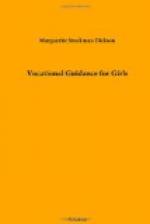The student who takes up college work, not as a specialized training, but as a completion of her general education, stands somewhat by herself. Such a girl may perhaps put off vocational decision until she is part way through her college years. The college sometimes awakens ambitions and brings to light abilities not hitherto discovered; and even when this does not occur, the choice may be made from the highest and most responsible positions filled by women. From the college girls we draw our high-school teachers and college instructors, our doctors, lawyers, and preachers, in so far as these professions are filled by women.
[Illustration: Photograph by Brown Bros. Among the many vocations belonging to the service group teaching is one of the most popular]
We are confronted by the statement, made again and again and reinforced by formidable rows of figures, that the more training a girl receives, the less she is inclined to marry or, if she does marry, to have children. The fact seems undeniable that in our larger eastern women’s colleges, at least, not more than half the graduates marry up to the age of forty, which we may accept as the probable limit of the marriage age for the average woman. The natural inference is that a college education in some way prevents or discourages marriage. This may or may not be true. To be quite fair, the statistics should cover the coeducational colleges as well as the colleges for women alone. Also some attempt should be made to discover how the likelihood of marriage is affected by the age at which girls finish their college course. Do the younger girls of a college class marry, while the older ones do not? Are the younger married graduates more often mothers than the older ones, or do they have more children?
[Illustration: Photograph by Brown Bros. The influence of the librarian extends far beyond the walls of the library]
If it is true that training is interfering with marriage and motherhood for our girls, the next step is not necessarily, as some modern hysterical students of the question seem to suggest, that we immediately cut out the training which, in case they do marry, will make them far more valuable wives, mothers, and members of the community; but rather so to time and place the training, and if necessary so to alter its character, that any such tendency away from marriage will be removed and that the trained women of the college and professional school shall be available for the great work of mothering the nation of the future.
A final word as to the place of the vocational guide in the choosing of vocations may not be amiss. That every teacher should consider himself or herself a helper in this most important work we must agree; but that any teacher must walk carefully, and use the guiding hand but sparingly, is equally true.




